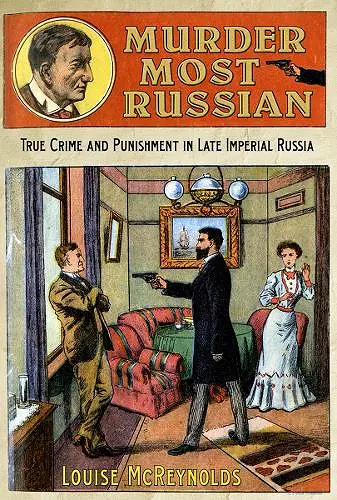Murder Most Russian
True Crime and Punishment in Late Imperial Russia
Format:Hardback
Publisher:Cornell University Press
Published:15th Dec '12
Currently unavailable, and unfortunately no date known when it will be back

How a society defines crimes and prosecutes criminals illuminates its cultural values, social norms, and political expectations. In Murder Most Russian, Louise McReynolds draws on a fascinating series of murders and subsequent trials that took place in the wake of the 1864 legal reforms enacted by Tsar Alexander II. For the first time in Russian history, the accused were placed in the hands of juries of common citizens in courtrooms that were open to the press. Drawing on a wide array of sources, McReynolds reconstructs murders that gripped Russian society, from the case of Andrei Gilevich, who advertised for a personal secretary and beheaded the respondent as a way of perpetrating insurance fraud, to the beating death of Marianna Time at the hands of two young aristocrats who hoped to steal her diamond earrings.
As McReynolds shows, newspapers covered such trials extensively, transforming the courtroom into the most public site in Russia for deliberation about legality and justice. To understand the cultural and social consequences of murder in late imperial Russia, she analyzes the discussions that arose among the emergent professional criminologists, defense attorneys, and expert forensic witnesses about what made a defendant’s behavior "criminal." She also deftly connects real criminal trials to the burgeoning literary genre of crime fiction and fruitfully compares the Russian case to examples of crimes both from Western Europe and the United States in this period. Murder Most Russian will appeal not only to readers interested in Russian culture and true crime but also to historians who study criminology, urbanization, the role of the social sciences in forging the modern state, evolving notions of the self and the psyche, the instability of gender norms, and sensationalism in the modern media.
Louise McReynold's latest work reinforces her position as an important voice in scholarship on late imperial Russian culture and society.... Murder Most Russian makes a valuable contribution to our understanding of the development of the Russian legal system, the intersection of crime and culture, and the transition to modernity in late imperial Russia.
-- Sharon A. Kowalsky * Slavic Review *McReynolds should be commended for the ways in which she integrates high political history with developments on the ground and uses cultural and social analysis to enrich her study of legal institutions. Artfully interweaving literaturese from several disciplines and historiography from different national contexts, Murder Most Russian lucidly tracks Russia's path toward its own unique form of modernity.
-- Faith Hillis * Journal of Modern History *Murder defined the Russian fin de siècle. From Dostoevsky's homicidal literary creations, through the 1881 assassination of Alexander II, to a host of killings impelled by greed and lust, the Empire seemed to be plotting its path to modernity in blood. Murder Most Russian is a superb study of the jury trials for homicide ushered in by the legal reforms of the 1860s.... Each trial yields a portrait of a fiercely contested public realm in which ideas about gender, morality, science, the state, and individual sovereignty were all up for grabs.... With this subtle and imaginative book, Louise McReynolds allows readers to peer not only inside the trials themselves but beyond them, into the wider courtroom of Russian public opinion.
-- Daniel Beer * Times Literary Supplement *This topic is not only luridly intriguing, but also gives great insight into the Russian cultural consciousness as the empire adapted itself to modern life. McReynolds's compelling book offers a homage to lively detective fiction and gruesome true-crime writing, while also providing an engaging history of crime's role in shaping Russian ways of seeing the world in the late imperial period.
-- Eugenia Kapsomera Amditis * Slavic and East European Journ- Winner of Honorable Mention, 2013 Heldt Prize for the Best B.
ISBN: 9780801451454
Dimensions: 235mm x 155mm x 24mm
Weight: 907g
288 pages